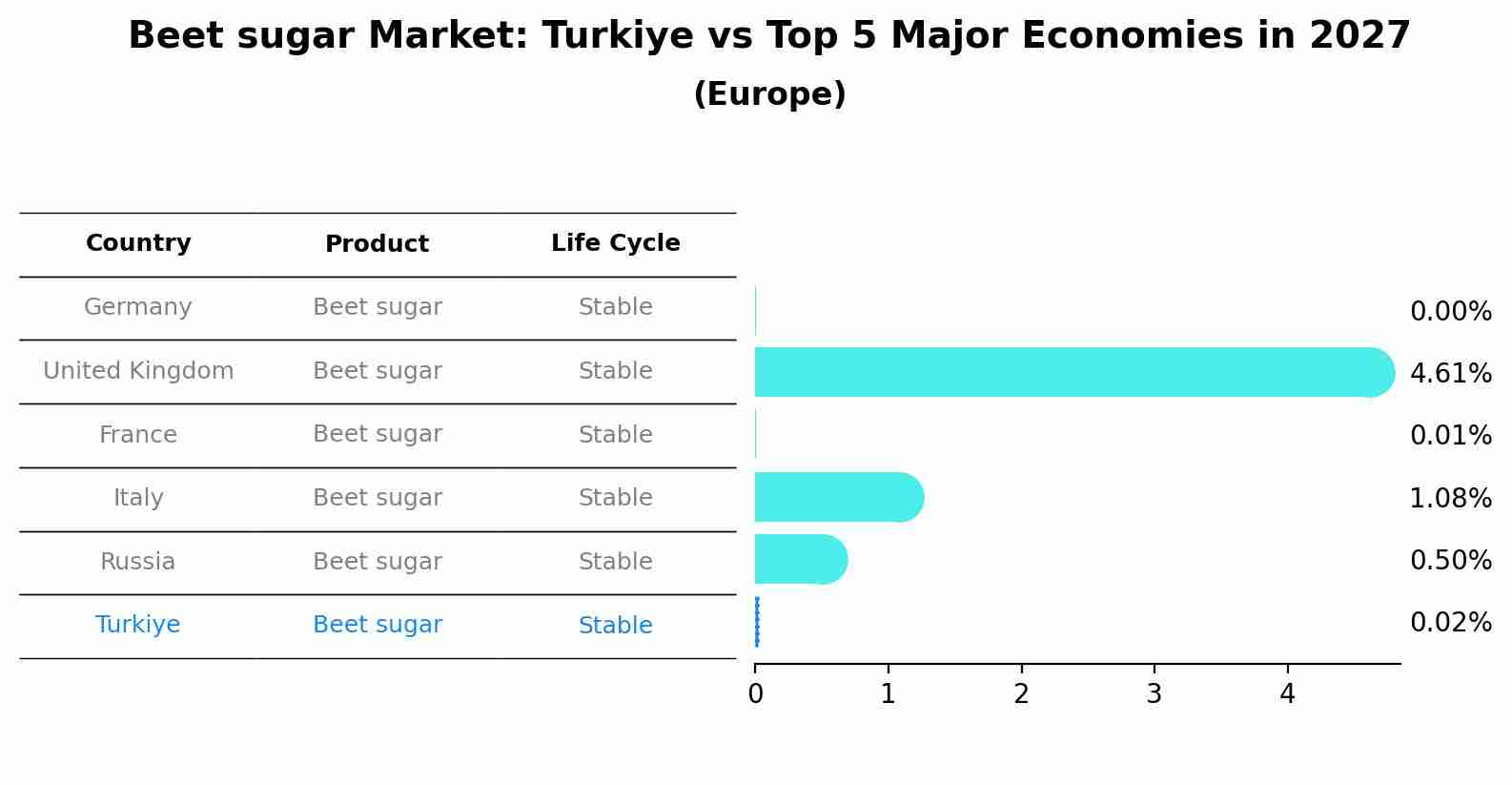Turkey Beet sugar Market Outlook | Revenue, Size, Industry, Value, Companies, Analysis, Growth, Forecast, COVID-19 IMPACT, Share & Trends
| Product Code: ETC091077 | Publication Date: Jun 2021 | Updated Date: Jun 2025 | Product Type: Report | |
| Publisher: 6Wresearch | Author: Shubham Deep | No. of Pages: 70 | No. of Figures: 35 | No. of Tables: 5 |
Beet sugar Market: Turkiye vs Top 5 Major Economies in 2027 (Europe)
The Beet sugar market in Turkiye is projected to grow at a stable growth rate of 0.02% by 2027, within the Europe region led by Germany, along with other countries like United Kingdom, France, Italy and Russia, collectively shaping a dynamic and evolving market environment driven by innovation and increasing adoption of emerging technologies.

Turkey Beet sugar Market Overview
The Turkey beet sugar market has been experiencing steady growth due to the increasing demand for sugar as a sweetening agent in various food and beverage products. The country`s favorable climate for sugar beet cultivation has made it a significant player in the global sugar market. Turkish sugar producers are investing in modern technologies to enhance the efficiency of sugar production, leading to higher yields and improved quality. The domestic consumption of beet sugar in Turkey is also rising, driven by the growing food processing industry and changing consumer preferences. Additionally, Turkey`s strategic location between Europe, Asia, and the Middle East makes it a key player in the sugar trade, both as an importer and exporter. Overall, the Turkey beet sugar market is poised for further growth and development in the coming years.
Turkey Beet sugar Market Trends
The Turkey beet sugar market is currently experiencing steady growth due to increasing consumer demand for healthier and locally-sourced sweeteners. There is a growing preference for beet sugar over cane sugar due to its perception as a more natural and sustainable alternative. Additionally, the government`s support for the domestic sugar industry and investments in modernizing beet sugar production facilities have contributed to the market`s expansion. Consumers are also seeking out beet sugar products as a non-GMO and gluten-free option. Furthermore, the rising awareness of the health benefits of beet sugar, such as its lower glycemic index compared to cane sugar, is driving its popularity among health-conscious individuals. Overall, these trends indicate a positive outlook for the Turkey beet sugar market in the foreseeable future.
Turkey Beet sugar Market Challenges
In the Turkey beet sugar market, one of the main challenges faced is the competition from other sugar sources such as sugarcane and corn. Beet sugar producers need to constantly innovate and improve efficiency in order to remain competitive in the market. Additionally, fluctuations in global sugar prices and government policies related to agriculture and trade can impact the profitability of beet sugar production in Turkey. Another challenge is the limited arable land available for beet cultivation, which can constrain the growth potential of the industry. Furthermore, factors such as climate change and water scarcity can also pose challenges to beet sugar production in Turkey, necessitating sustainable practices and investments in technology to overcome these obstacles.
Turkey Beet sugar Market Investment Opportunities
Investment opportunities in the Turkey beet sugar market include potential growth in the demand for locally produced sugar due to an increasing preference for domestic products. This market offers opportunities for investments in sugar beet cultivation, processing facilities, and distribution networks to capitalize on the country`s self-sufficiency goals in sugar production. Additionally, advancements in technology and sustainable farming practices present opportunities for innovation and efficiency improvements in the production process. With Turkey being one of the leading beet sugar producers in the world, investing in this market can provide exposure to a stable and established industry with the potential for growth both domestically and internationally. Overall, investing in the Turkey beet sugar market could offer long-term returns and strategic positioning in the global sugar industry.
Turkey Beet sugar Market Government Policy
In Turkey, the government implements various policies to regulate the sugar market, including the beet sugar industry. One key policy is the Sugar Market Law, which aims to ensure the stability and sustainability of the sugar sector by setting production quotas, price controls, and import/export regulations. The government also provides subsidies and support to beet sugar producers to encourage domestic production and reduce reliance on imports. Additionally, there are initiatives to promote research and development in the sector to enhance productivity and competitiveness. Overall, the government`s policies in the Turkey beet sugar market are focused on balancing the interests of producers, consumers, and the overall economy while striving for self-sufficiency and efficiency in the industry.
Turkey Beet sugar Market Future Outlook
The future outlook for the Turkey beet sugar market appears promising due to increasing demand for natural sweeteners and a growing preference for locally sourced products. The market is expected to witness steady growth driven by factors such as rising health consciousness among consumers, expanding food and beverage industry, and government initiatives to promote domestic sugar production. Additionally, advancements in technology and sustainable farming practices are likely to boost beet sugar production efficiency and quality in Turkey. However, challenges such as fluctuating raw material prices, changing consumer preferences, and competition from other sweeteners may impact market dynamics. Overall, with strategic investments in production capabilities, marketing efforts, and product innovation, the Turkey beet sugar market is poised for a positive trajectory in the near future.
Key Highlights of the Report:
- Turkey Beet sugar Market Outlook
- Market Size of Turkey Beet sugar Market, 2021
- Forecast of Turkey Beet sugar Market, 2027
- Historical Data and Forecast of Turkey Beet sugar Revenues & Volume for the Period 2018 - 2027
- Turkey Beet sugar Market Trend Evolution
- Turkey Beet sugar Market Drivers and Challenges
- Turkey Beet sugar Price Trends
- Turkey Beet sugar Porter's Five Forces
- Turkey Beet sugar Industry Life Cycle
- Historical Data and Forecast of Turkey Beet sugar Market Revenues & Volume By Function for the Period 2018 - 2027
- Historical Data and Forecast of Turkey Beet sugar Market Revenues & Volume By Regular for the Period 2018 - 2027
- Historical Data and Forecast of Turkey Beet sugar Market Revenues & Volume By Medical Conditions for the Period 2018 - 2027
- Historical Data and Forecast of Turkey Beet sugar Market Revenues & Volume By Organizational Strucuture for the Period 2018 - 2027
- Historical Data and Forecast of Turkey Beet sugar Market Revenues & Volume By Organized Market for the Period 2018 - 2027
- Historical Data and Forecast of Turkey Beet sugar Market Revenues & Volume By Unorganized Market for the Period 2018 - 2027
- Turkey Beet sugar Import Export Trade Statistics
- Market Opportunity Assessment By Function
- Market Opportunity Assessment By Organizational Strucuture
- Turkey Beet sugar Top Companies Market Share
- Turkey Beet sugar Competitive Benchmarking By Technical and Operational Parameters
- Turkey Beet sugar Company Profiles
- Turkey Beet sugar Key Strategic Recommendations
Frequently Asked Questions About the Market Study (FAQs):
1 Executive Summary |
2 Introduction |
2.1 Key Highlights of the Report |
2.2 Report Description |
2.3 Market Scope & Segmentation |
2.4 Research Methodology |
2.5 Assumptions |
3 Turkey Beet sugar Market Overview |
3.1 Turkey Country Macro Economic Indicators |
3.2 Turkey Beet sugar Market Revenues & Volume, 2021 & 2027F |
3.3 Turkey Beet sugar Market - Industry Life Cycle |
3.4 Turkey Beet sugar Market - Porter's Five Forces |
3.5 Turkey Beet sugar Market Revenues & Volume Share, By Function, 2021 & 2027F |
3.6 Turkey Beet sugar Market Revenues & Volume Share, By Organizational Strucuture, 2021 & 2027F |
4 Turkey Beet sugar Market Dynamics |
4.1 Impact Analysis |
4.2 Market Drivers |
4.3 Market Restraints |
5 Turkey Beet sugar Market Trends |
6 Turkey Beet sugar Market, By Types |
6.1 Turkey Beet sugar Market, By Function |
6.1.1 Overview and Analysis |
6.1.2 Turkey Beet sugar Market Revenues & Volume, By Function, 2018 - 2027F |
6.1.3 Turkey Beet sugar Market Revenues & Volume, By Regular, 2018 - 2027F |
6.1.4 Turkey Beet sugar Market Revenues & Volume, By Medical Conditions, 2018 - 2027F |
6.2 Turkey Beet sugar Market, By Organizational Strucuture |
6.2.1 Overview and Analysis |
6.2.2 Turkey Beet sugar Market Revenues & Volume, By Organized Market, 2018 - 2027F |
6.2.3 Turkey Beet sugar Market Revenues & Volume, By Unorganized Market, 2018 - 2027F |
7 Turkey Beet sugar Market Import-Export Trade Statistics |
7.1 Turkey Beet sugar Market Export to Major Countries |
7.2 Turkey Beet sugar Market Imports from Major Countries |
8 Turkey Beet sugar Market Key Performance Indicators |
9 Turkey Beet sugar Market - Opportunity Assessment |
9.1 Turkey Beet sugar Market Opportunity Assessment, By Function, 2021 & 2027F |
9.2 Turkey Beet sugar Market Opportunity Assessment, By Organizational Strucuture, 2021 & 2027F |
10 Turkey Beet sugar Market - Competitive Landscape |
10.1 Turkey Beet sugar Market Revenue Share, By Companies, 2021 |
10.2 Turkey Beet sugar Market Competitive Benchmarking, By Operating and Technical Parameters |
11 Company Profiles |
12 Recommendations |
13 Disclaimer |
- Single User License$ 1,995
- Department License$ 2,400
- Site License$ 3,120
- Global License$ 3,795
Search
Related Reports
- Portugal Occupational Health & Safety Services Market (2025-2031) | Strategy, Consumer Insights, Analysis, Investment Trends, Opportunities, Growth, Size, Share, Industry, Revenue, Segments, Value, Segmentation, Supply, Forecast, Restraints, Outlook, Competition, Drivers, Trends, Demand, Pricing Analysis, Competitive, Strategic Insights, Companies, Challenges
- Netherlands Occupational Health and Safety Services Market (2025-2031) | Strategy, Consumer Insights, Analysis, Investment Trends, Opportunities, Growth, Size, Share, Industry, Revenue, Segments, Value, Segmentation, Supply, Forecast, Restraints, Outlook, Competition, Drivers, Trends, Demand, Pricing Analysis, Competitive, Strategic Insights, Companies, Challenges
- Belgium and Luxembourg Facility Management Market (2025-2031) | Strategy, Consumer Insights, Analysis, Investment Trends, Opportunities, Growth, Size, Share, Industry, Revenue, Segments, Value, Segmentation, Supply, Forecast, Restraints, Outlook, Competition, Drivers, Trends, Demand, Pricing Analysis, Competitive, Strategic Insights, Companies, Challenges
- Russia Women Intimate Apparel Market (2025-2031) | Strategy, Consumer Insights, Analysis, Investment Trends, Opportunities, Growth, Size, Share, Industry, Revenue, Segments, Value, Segmentation, Supply, Forecast, Restraints, Outlook, Competition, Drivers, Trends, Demand, Pricing Analysis, Competitive, Strategic Insights, Companies, Challenges
- Africa Chocolate Market (2025-2031) | Size, Share, Trends, Growth, Revenue, Analysis, Forecast, industry & Outlook
- Global Hydroxychloroquine And Chloroquine Market (2025-2031) | Industry, Trends, Size, Outlook, Growth, Value, Companies, Revenue, Analysis, Share, Forecast
- Saudi Arabia Plant Maintenance Market (2025-2031) | Industry, Size, Growth, Revenue, Value, Companies, Forecast, Analysis, Share & Trends
- Taiwan Electric Truck Market (2025-2031) | Outlook, Industry, Revenue, Size, Forecast, Growth, Analysis, Share, Companies, Value & Trends
- South Korea Electric Bus Market (2025-2031) | Outlook, Industry, Companies, Analysis, Size, Revenue, Value, Forecast, Trends, Growth & Share
- Africa Low Temperature Powder Coating Market (2025-2031) | Companies, Competition, Size, Challenges, Segmentation, Trends, Competitive, Industry, Supply, Strategy, Investment Trends, Growth, Segments, Restraints, Strategic Insights, Revenue, Share, Forecast, Drivers, Analysis, Pricing Analysis, Demand, Consumer Insights, Value, Opportunities, Outlook
Industry Events and Analyst Meet
Our Clients
Whitepaper
- Middle East & Africa Commercial Security Market Click here to view more.
- Middle East & Africa Fire Safety Systems & Equipment Market Click here to view more.
- GCC Drone Market Click here to view more.
- Middle East Lighting Fixture Market Click here to view more.
- GCC Physical & Perimeter Security Market Click here to view more.
6WResearch In News
- Doha a strategic location for EV manufacturing hub: IPA Qatar
- Demand for luxury TVs surging in the GCC, says Samsung
- Empowering Growth: The Thriving Journey of Bangladesh’s Cable Industry
- Demand for luxury TVs surging in the GCC, says Samsung
- Video call with a traditional healer? Once unthinkable, it’s now common in South Africa
- Intelligent Buildings To Smooth GCC’s Path To Net Zero













